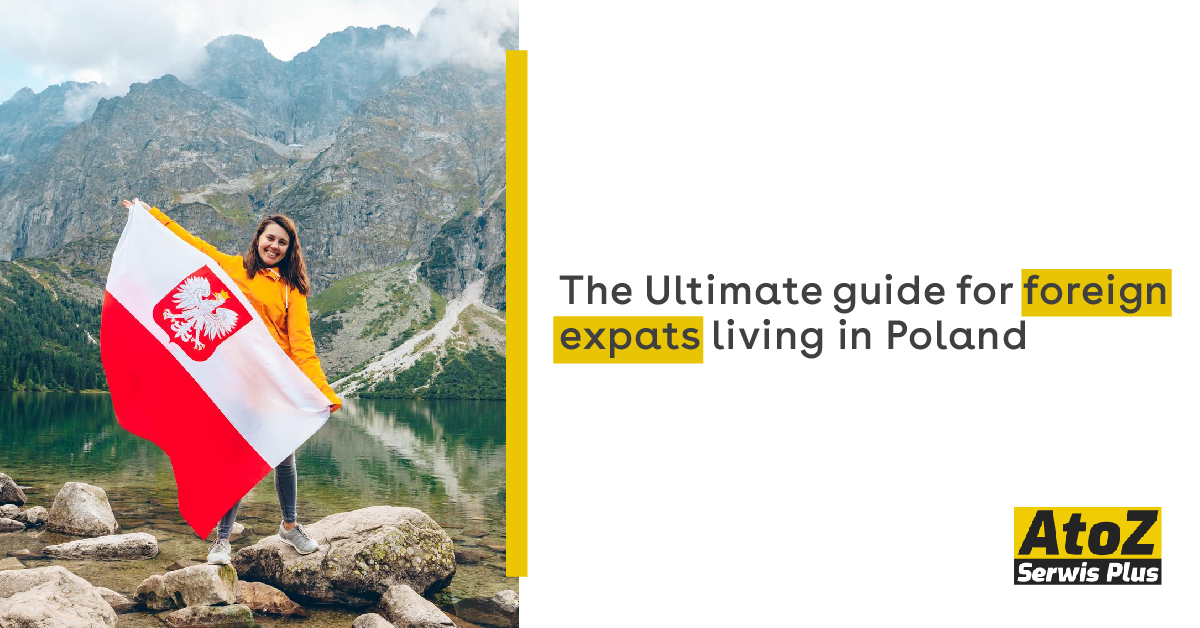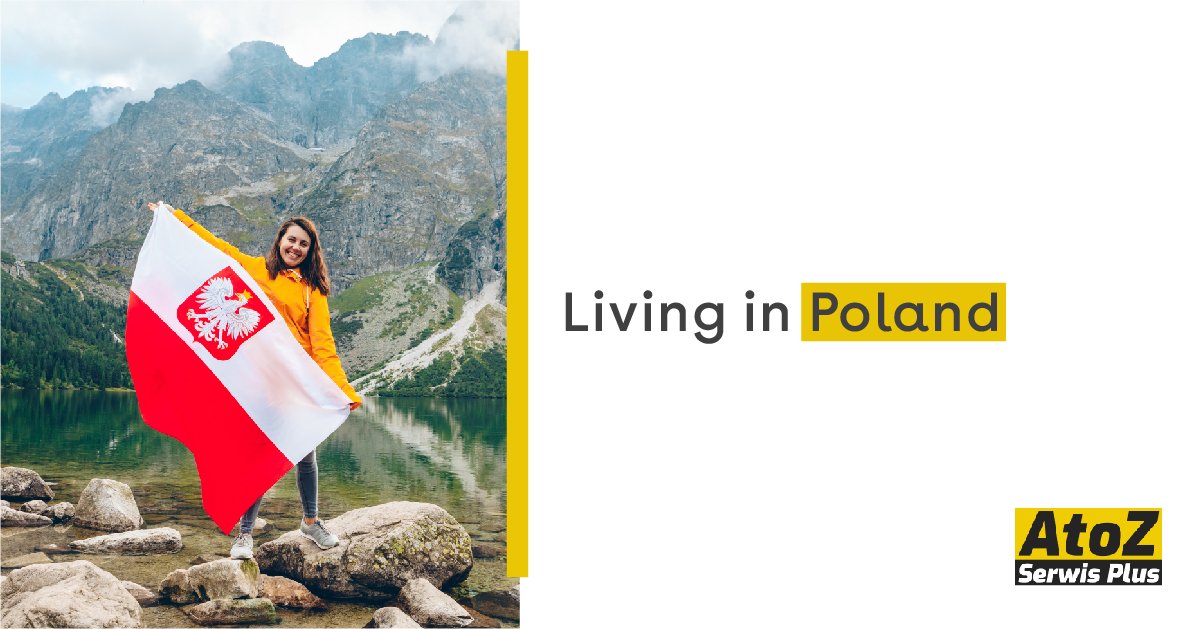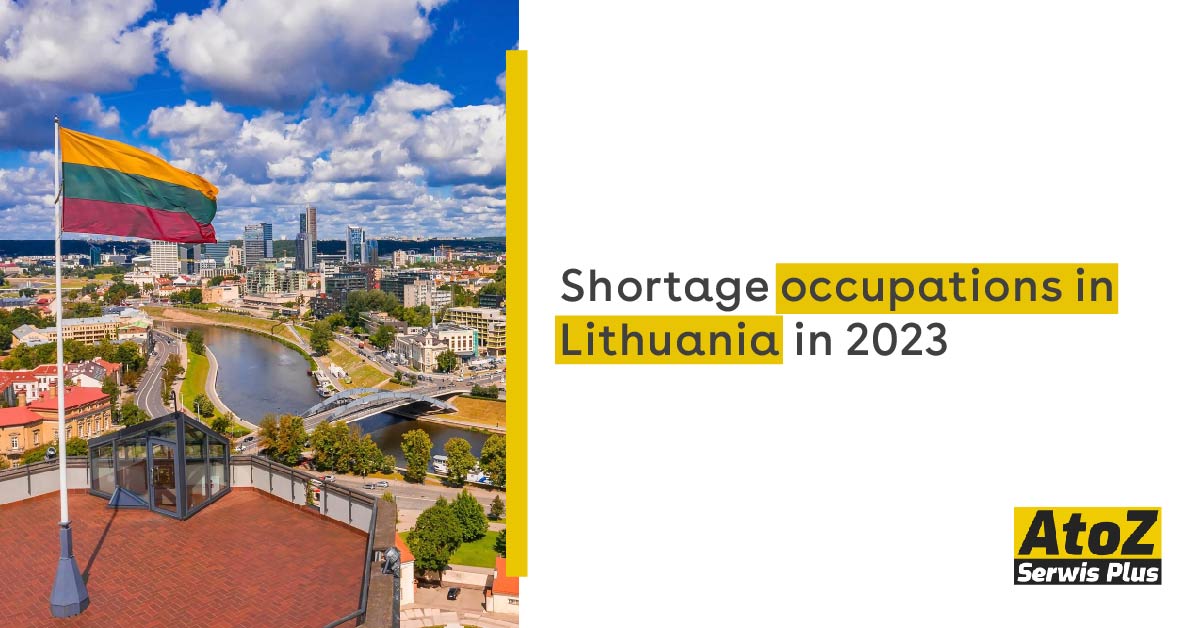

The Ultimate Guide for Foreign Expats Living in Poland
About Poland
Poland, nestled in the heart of Central Europe, is a country that encapsulates a rich tapestry of history, culture, and natural beauty. Its capital, Warsaw, is a bustling metropolis that harmoniously blends modernity with centuries-old traditions. As you explore this captivating nation, you'll discover a land that has endured the trials of history to emerge as a dynamic and resilient European nation.
With a population exceeding 38 million, Poland is one of Europe's most populous countries. Its official language is Polish, a linguistic treasure that reflects the nation's deep-rooted heritage. Poland's governance is a parliamentary republic, where the President is the head of state, and the Prime Minister is the head of government.
Poland's history is a captivating narrative of resilience and rebirth. It was once a vast empire that suffered partitions and foreign rule in the 18th and 19th centuries. However, it rose from the ashes of conflict to regain independence in 1918. This history is etched into its architecture, culture, and national identity.
Today, Poland boasts a rapidly growing and diverse economy. As a member of the European Union, it has experienced remarkable development since joining in 2004. Key sectors include manufacturing, agriculture, services, and technology, reflecting its commitment to progress and innovation.
Poland's cultural heritage is a testament to its enduring spirit. It has produced renowned figures in literature, music, and film. The haunting compositions of Frédéric Chopin, a native son, continue to resonate worldwide. Polish cuisine tantalises the taste buds with dishes like pierogi (dumplings) and kielbasa (sausage), reflecting the country's culinary traditions.
Travelers are drawn to Poland for its treasures, both artificial and natural. Historic cities like Krakow transport visitors to another era with its meticulously preserved medieval architecture. The Warsaw Old Town Square is a captivating blend of the past and the present. Meanwhile, the Tatra Mountains and the primaeval Bia?owie?a Forest offer breathtaking landscapes for those seeking a connection with nature.
Poland's landmarks include the iconic Wawel Castle in Krakow, the Auschwitz concentration camp, and the picturesque Wieliczka Salt Mine. Each tells a story of triumph or tragedy, contributing to Poland's complex narrative.
For travellers, Poland offers a well-developed transportation network, making it accessible for exploration. Modern airports like Warsaw Chopin Airport and Krakow John Paul II International Airport connect the nation with the world, inviting adventurers to discover its diverse landscapes and vibrant culture.
In every corner of Poland, from the cobbled streets of its historic towns to the lush wilderness of its national parks, you'll find a nation that embraces its past while forging ahead into an exciting future. Poland is an enchanting destination where history, culture, and natural beauty converge, inviting you to explore its many facets and create unforgettable memories.
Living Cost in Poland
- Living Cost in Poland: Living costs in Poland can be diverse and influenced by location, personal preferences, and circumstances. It's worth noting that larger cities like Warsaw and Krakow generally have higher expenses than smaller towns. Here's a more detailed overview of the various aspects of living costs in Poland:
- Accommodation: Renting a living place is one of the most significant expenses. In major cities, the cost of rent is notably higher than in smaller towns. Apartments in popular neighbourhoods tend to be more expensive, while shared accommodations or student dormitories can offer more budget-friendly options. Rent for a one-bedroom apartment in the city centre can range from 1,500 to 3,500 PLN per month.
- Food: The cost of groceries and dining out can vary depending on your choices. Preparing meals at home with locally sourced ingredients is generally cost-effective. However, food expenses will increase if you prefer eating out or buying premium products. A monthly grocery bill for a single person can range from 300 to 600 PLN.
- Transportation: Public transportation in Poland is efficient and affordable. Monthly transportation passes are available, and their cost depends on your location. It can range from 100 to 200 PLN per month in major cities. If you own a car, please factor in fuel, insurance, and maintenance costs.
- Entertainment: Your entertainment expenses vary widely depending on your interests and social activities. Poland offers a rich cultural scene with numerous affordable or accessible events and attractions. However, if you enjoy frequent outings like movies, concerts, or dining at restaurants, be prepared to allocate a budget for entertainment. Monthly expenses in this category might range from 200 to 500 PLN or more.
- Health Insurance: Health insurance costs differ based on your status. Students often access reasonably priced health insurance plans through their universities, while employed individuals may need to budget for private health insurance. Monthly premiums can vary.
- Utilities: Monthly utility costs encompass electricity, water, heating, and internet. Depending on your accommodation size and usage, these expenses typically range from 150 to 400 PLN.
- Miscellaneous Expenses: Pay attention to expenses like mobile phone bills, personal care items, and unexpected costs. These can add an extra 200 to 400 PLN to your monthly budget.
Study Options in Poland
Poland is becoming an increasingly popular destination for international students seeking high-quality education in a diverse and culturally rich environment. The country boasts many study options, making it an attractive choice for those pursuing their academic goals abroad.
- Academic Institutions: Poland has numerous universities and colleges nationwide. Some of the most renowned institutions include the University of Warsaw, Jagiellonian University in Krakow, and Wroclaw University. These institutions offer a broad spectrum of academic programs in various fields of study, catering to diverse interests and career aspirations.
- Language of Instruction: One of the significant advantages for international students in Poland is the availability of programs taught in English. This allows students from all over the world to access high-quality education without the barrier of language proficiency. Whether you're interested in business, engineering, humanities, or medicine, you can find programs in English that align with your academic interests.
- Degree Levels: Poland offers a complete educational spectrum, including Bachelor's, Master's, and PhD programs. This means you can begin your academic journey with an undergraduate degree, progress to a Master's program, and even pursue a doctoral degree in your chosen field.
- Affordability: Studying in Poland is cost-effective compared to many Western European countries. Tuition fees vary depending on the institution and program, with public universities typically offering lower fees for EU/EEA students. Non-EU/EEA students may pay slightly higher fees, but they are still reasonable compared to other study destinations.
- Financial Support: International students have access to various scholarship opportunities, including government scholarships, university-specific awards, and those offered by international organisations. These scholarships can significantly alleviate the financial burden of pursuing higher education in Poland.
- Student Life: Poland offers a vibrant student life with abundant cultural events, clubs, and student organisations. You'll have the opportunity to engage in extracurricular activities, meet people from diverse backgrounds, and immerse yourself in the country's rich history and culture.
- Practical Considerations: While many programs are available in English, learning some basic Polish can enhance your daily life and interactions with locals. Additionally, international students are typically allowed to work part-time during their studies. Postgraduation, there are options to extend your stay for job-seeking or gaining work experience in Poland.
- Visa Requirements: International students outside the EU/EEA must obtain a student visa to study in Poland. You must know the specific visa requirements and application procedures at your home country's nearest Polish embassy or consulate.
Work Permit in Poland
- Part-time Work: International students enrolled in full-time degree programs in Poland can work part-time during the academic year. This typically allows them to work up to 20 hours per week without a separate work permit. This part-time employment can be an excellent way for students to support themselves financially while studying.
- Full-time Work: International students can work full-time without restrictions during semester breaks, such as summer and winter vacations. This flexibility can allow students to gain more work experience and earn additional income during their breaks.
- Work Permit after Graduation: Upon completing their studies in Poland, international students can apply for a temporary residence permit for work purposes. This permit allows them to stay in Poland and seek employment legally. It's an essential step for those wishing to continue living and working in Poland after their studies.
- Requirements for a Work Permit: The specific requirements for obtaining a work permit in Poland may change, so international students must keep updated with the latest information. They can do this by contacting the Polish authorities responsible for immigration and work permits or seeking guidance from their university's international office. Typically, requirements may include proof of a job offer, adequate financial means, and proper documentation.
- Language Proficiency: While many jobs in Poland may require proficiency in the Polish language, there are also opportunities in international or English-speaking environments. Language requirements can vary depending on the job and employer, so students should consider their language skills when seeking employment.
- Job Search: International students can start their job search while still in Poland, and they may receive assistance from their university's career services or job placement programs. Networking, attending job fairs, and exploring online job boards are also effective ways to find employment opportunities.
- Taxation: International students working in Poland should know the tax regulations for their income. They may need to pay taxes on their earnings depending on their income level and tax treaties between Poland and their home country. Seeking advice from tax professionals or authorities can help ensure compliance with tax laws.
- Residence Permit Renewal: If international students plan to continue working in Poland beyond the expiration of their temporary residence permit for work purposes, they will need to explore options for permit renewal or other long-term visa or residence solutions to maintain legal status in the country.
Work Visa in Poland
- Determining Eligibility: The first step in obtaining a work visa in Poland is to assess your eligibility. This depends on your nationality and the nature of the work you're planning to do. Polish immigration rules may vary for different nationalities and job types.
- Job Offer: To apply for a work visa, you must secure a job offer from a Polish employer. The employer should provide a formal employment contract outlining your employment terms and conditions, including salary and job responsibilities.
- Document Preparation: Gather all the necessary documents for your visa application. Please send me a valid passport with sufficient blank pages, a completed visa application form, a recent passport-sized photo, your employment contract, proof of accommodation in Poland, and evidence of financial means to support yourself during your stay.
- Visa Application: Please get in touch with your home country's nearest Polish embassy or consulate to start the visa application process. Follow their specific application procedures and requirements.
- In-Person Appointment: Attend the visa appointment on the scheduled date. Submit your visa application along with all the required documents. You may also be required to pay the visa processing fee during this appointment.
- Biometric Data: In some cases, you may need to provide biometric data, such as fingerprints and a photograph, as part of the visa application process.
- Processing Time: Be aware that the processing time for work visas can vary depending on your nationality and the number of applications being processed. Be patient while waiting for your application to be reviewed.
- Visa Decision: Once your application is processed, you will receive a decision on your visa application. If approved, the consulate will affix a visa sticker to your passport. If denied, you will receive a written explanation of the reasons for the refusal.
- Travel Arrangements: You can travel to Poland and commence employment with an approved work visa. Please make sure that you arrive within the validity period of your visa.
- Renewal and Residency: Depending on the type of work visa and your intended stay duration, you may need to renew your visa periodically. Alternatively, you can explore obtaining a residence permit for work, offering more extended stay options and potential pathways to permanent residency.
- Compliance with Regulations: In Poland, it's crucial to adhere to all immigration and employment regulations. Keep your visa or residence permit valid and report any changes in your employment or personal circumstances to the appropriate authorities.
Job in Poland
- Online Job Portals: There are several online job portals where you can search for job opportunities in Poland. Some popular websites include Pracuj.pl, Indeed.pl, LinkedIn, and Glassdoor. You can filter your search by location, industry, and job type.
- Networking: Building a professional network in Poland can be highly beneficial. Attend industry events, seminars, and conferences to connect with professionals in your field. Websites like Meetup.com can help you find relevant networking events.
- Recruitment Agencies: Many recruitment agencies in Poland specialise in placing candidates in various industries. These agencies can assist you in finding suitable job openings and guide the job market.
- CV and Cover Letter: When applying for jobs in Poland, please make sure that your CV and cover letter are well-structured and tailored to the specific job you're applying for. Could you be sure to include relevant skills and experience?
- Language Skills: While English is widely spoken, especially in the business and IT sectors, having some knowledge of the Polish language can be advantageous, especially for jobs that require extensive interaction with locals.
- Work Permits: If you are a non-EU citizen, you may need a work permit to work in Poland. Could you check the Polish government's official website or consult with your potential employer to understand the visa and work permit requirements?
- Industry Focus: As mentioned earlier, sectors like IT, finance, manufacturing, and healthcare are particularly promising in Poland. IT professionals, in particular, are in high demand due to the country's thriving tech industry.
- Salary Expectations: Research typical salary ranges for your position and industry in Poland. Salaries can vary significantly based on location, experience, and your company.
- Cost of Living: Consider living in Poland in your chosen city or region. Significant cities like Warsaw, Krakow, and Wroclaw tend to have higher living costs than smaller towns.
- Legal Requirements: Ensure you comply with all legal requirements for working in Poland, including taxes and social security contributions.
Salary in Poland
According to the data from Statistics Poland, the average gross salary in 2022 was 6,346 zlotys. In January 2023, the average wage was recorded at 6,884 zlotys. This means that there was a 13.5% increase over the year.
Gross salary refers to the earnings before taxes, insurance, and other mandatory deductions. After all deductions are made, the net salary remains the take-home pay.
Nevertheless, Polish experts view this information with more than scepticism, pointing out that official statistics are imperfect because they only include companies with ten or more employees in their research. This means that over 90% of firms are not included in the calculations.
According to the Ministry of Development and Technology, there are 2.62 million companies in Poland, with micro-enterprises being the largest group of approximately 2.2 million. Nearly 4.2 million people work in these micro-enterprises. In comparison, only 1.5 million employees work in medium-sized enterprises and 3.2 million in large ones.
Thus, the official data only reflects employees' income in large enterprises. In reality, salaries in Poland ranging from 6,000 to 7,000 zlotys can be earned by middle and senior-level managers working in regional centres. Meanwhile, young specialists in larger cities cannot expect an average salary, nor can employees in smaller towns.
Experts note that out of 15 industries, 9 have specialists who earn less than the average. The IT and energy sectors inflate the average salary in Poland, where the income level is high.
Working Hours in Poland
Working time in Poland is fixed in the Labour Code. It cannot exceed 40 hours per week in a reference period of 4 months.
It is possible to extend working time in case of particularly justified needs of the employer. With the employee’s agreement, working up to 13 hours daily is possible.
However, in any case, the weekly working time can be at most 48 hours. In a calendar year, overtime hours are limited to 150 unless otherwise provided in an agreement.
For each hour of overtime, the employee receives their usual pay increased by (i) 100% for night work, Sundays, and public holidays or (ii) 50% for other days. If the weekly working time within a reference period is exceeded, the employee is entitled to an increase of 100%.
The above-described system of weekly working hours and overtime pay does not apply to employees managing a company for the employer.
The employee is entitled to continuous rest of 11 hours per day and 35 hours per week. If they work at least 6 hours a day, they have a right to a 15-minute break, which counts as working time. The employer may also set a break of up to 60 minutes, which is not included in active time.
Night work starts at 9 p.m. and ends at 7 a.m. The Labour Code defines a « night worker » as an employee working at least 3 hours per day or at least 1/4 of the working time at night. Employees working at night are entitled to a wage supplement equal to 20% of the minimum wage’s hourly rate.
The Polish Labour Code contains a limited list of reasons for working on statutory holidays and Sundays—sont permis. In compensation for work on these days, the employer shall grant a day off work as a general rule.
Work Temporary Residence Card (TRC) in Poland
Eligibility Assessment: Before applying for a TRC in Poland, assess your eligibility, typically based on having a valid job offer and fulfilling specific requirements.
- Job Offer: Secure a job offer from a Polish employer who will support your application.
- Document Preparation: Gather the necessary documents, including a completed application form, valid passport, health insurance proof, financial means evidence, clean criminal record certificate, medical certificate, employment contract or job offer, and proof of accommodation.
- Application Submission: Submit your TRC application in person at the Voivodeship Office or online through the immigration portal.
- Biometric Data Collection: You may need to provide biometric data like fingerprints and a photograph.
- Fee Payment: Pay the application fee when submitting your application.
- Interview (if required): Attend an interview if the authorities ask.
- Waiting Period: Expect a processing period for your application.
- TRC Issuance: Upon approval, receive a Temporary Residence Card granting legal residence and work rights.
- For your renewal, please remember the need for TRC renewal before it expires.
Permanent Residency (PR) in Poland
- Legal Residence: You must have legally resided in Poland for five years, usually five years. During this time, you should hold a valid temporary residence permit.
- Stable and Regular Source of Income: You should demonstrate that you have a steady and regular source of income sufficient to cover your living expenses in Poland. This might include employment, business income, or other legal means of financial support.
- Health Insurance: You must have health insurance covering your medical expenses in Poland. This is an essential aspect of your application.
- No Criminal Record: You should have a clean criminal record in Poland and any other country you've lived in.
- Permanent Residence Permit Application: To apply for permanent residency, you will need to submit an application to the relevant authorities, which is typically the Voivodeship Office (Urz?d Wojewódzki) or the Polish Consulate in your home country if you meet certain conditions.
- Decision Process: The authorities will review your application, conduct background checks, and interview you to assess your eligibility. If your application is approved, you will receive a permanent residence permit.
How to Get a Passport in Poland
It would be best to obtain a Polish passport if you were a Polish citizen. If you're not a citizen but have Polish ancestry or are eligible for citizenship through other means, you can apply for citizenship first. Once you are a citizen, you can apply for a Polish passport through the appropriate government authorities.
-
Confirm Your Eligibility:
- To apply for a Polish passport, you must be a Polish citizen. If you were born in Poland or have Polish parents, you are likely already a citizen. If not, you may be eligible for citizenship through other means, such as ancestry or marriage to a Polish citizen.
-
Obtain Polish Citizenship (if necessary):
- If you are not already a Polish citizen but are eligible for citizenship, you must first go through the citizenship application process. This process can vary depending on your specific circumstances. You may need to provide documents proving your eligibility, such as birth records, marriage certificates, or other relevant documents. Contact the nearest Polish consulate or embassy to inquire about the requirements and application process for obtaining Polish citizenship.
-
Gather Required Documents:
- Once you are a Polish citizen, you can gather the necessary documents for your passport application. The required documents may include:
- Proof of Polish citizenship (e.g., citizenship certificate)
- Valid identification (e.g., Polish national ID card or previous Polish passport)
- Proof of residence in Poland (if applicable)
- Passport-sized photos (usually 35mm x 45mm)
- Completed passport application form (available at the passport office or online)
- Once you are a Polish citizen, you can gather the necessary documents for your passport application. The required documents may include:
-
Visit the Passport Office:
- Locate the nearest Polish passport office or consulate where you can submit your passport application. The nearest office or consulate can be found on the Polish Ministry of Foreign Affairs website.
-
Submit Your Application:
- Visit the passport office or consulate and submit your application and all the required documents. Be prepared to pay the passport application fee, which can vary depending on your age and the type of passport you are applying for.
-
Biometric Data Collection:
- You will likely need your biometric data (such as fingerprints and a digital photograph) taken at the passport office or consulate as part of the application process.
-
Wait for Processing:
- Passport processing times can vary, but receiving your Polish passport typically takes several weeks. Check with the authorities for the current processing time estimates.
-
Collect Your Passport:
- Once your passport is ready, you will be notified to pick it up in person at the same passport office or consulate where you submitted your application. You may need to provide additional identification when collecting your passport.
-
Travel and Use Your Passport:
- Once you have your Polish passport, you can use it for international travel and as an official identification document.
Safety in Poland
Poland is generally considered a safe country. However, like any other place, taking precautions is essential, especially in large cities, to avoid petty crime. Follow local advice and guidelines for personal safety and security, and be aware of your surroundings.
-
Stay Alert: Attention to your surroundings, especially in crowded areas, public transportation, and tourist spots. Keep an eye on your belongings to prevent theft.
-
Pickpocketing: Petty theft, including pickpocketing, can occur in crowded places like markets, public transportation, and tourist attractions. Be mindful of your belongings, use anti-theft bags, and consider carrying a money belt for your valuables.
-
Scams: Be cautious of common tourist scams, such as fake police officers or people pretending to be distressed. If anyone is suspicious, please keep a safe distance and ask for help from uniformed law enforcement if needed.
-
Public Transportation: While public transportation in Poland is generally safe, be aware of your surroundings and belongings when using trams, buses, and trains. Keep an eye on your bags and personal items.
-
Night Safety: Exercise caution when walking alone at night, especially in less well-lit areas. Please be sure to stick to well-populated and well-lit streets when possible.
-
Use Reputable Services: When using taxis or rideshare services, choose reputable companies and ensure the taxi has a working meter. Avoid unlicensed or unofficial taxi services.
-
Emergency Numbers: Know the emergency numbers in Poland. The universal emergency number is 112, and you can also dial 997 for police assistance and 998 for medical emergencies.
-
Language: While English is spoken by many people in Poland, especially in urban areas, it's helpful to learn a few basic Polish phrases or carry a translation app to communicate effectively in case of emergencies.
-
Travel Insurance: Consider purchasing travel insurance that covers medical emergencies, trip cancellations, and theft to provide additional peace of mind during your trip.
-
Local Advice: Seek advice from locals, hotel staff, or official tourist information centres for recommendations on safe places to visit and areas to avoid.
Poland Passport Ranking
The Polish passport is currently ranked 9th place on the Guide Passport Index. It provides visa-free access to 184 countries. With a high mobility score, it is one of the best-ranking passports in the world. Polish passport holders have visa-free access and visas on arrival to countries such as the United Kingdom, United Arab Emirates, Japan, and the European Union. This allows almost instant travel opportunities worldwide. Polish passport holders do, however, require a visa to enter about 45 destinations worldwide. Some countries where a visa is needed are China, India and Australia.
The Poland passport ranking relative to other global passports is calculated by adding up the number of countries that allow Poland passport holders to enter without a visa (i.e. visa-free countries) and those that would enable Poland passport holders to enter by obtaining a visa on arrival (i.e. visa-on-arrival countries) or electronic travel authorisation (eTA). There are currently 143 Poland passport visa-free countries, 32 Poland visa-on-arrival countries, and nine eTA destinations.
Altogether, Poland passport holders can enter 184 destinations without a visa, through a visa on arrival, or via an eTA. As a result, the Poland passport ranks 9 in the world.
Separate from these Poland visa-free countries and visa-on-arrival countries; there are 45 additional destinations in which Poland passport holders either need a physical visa to enter or an eVisa (i.e. visa required countries).
How can AtoZ Serwis Plus assist you?
AtoZ Serwis Plus will provide the services listed below to get a European Country work visa:
- Counselling: Get AtoZ Serwis Plus’ free counselling services.
- Job services: Avail of AtoZ Serwis Plus’ job search services to find jobs in European Country
- Reviewing requirements: AtoZ Serwis Plus reviews all your European Country work visa requirements.
- Application process: We also help in completing your application process
- Requirements checklist: AtoZ Serwis Plus also helps you in arranging the requirements for a European Country work visa
- Complete visa application support
- Assistance with collecting supporting documentation
- Visa Interview Preparation – if required
- Updates and follow-up with the Consulate
Willing to work in a European Country? Talk to AtoZ Serwis Plus, Europe’s no. 1 overseas immigration consultant.
Would you like some advice? So that you know, the information I've included here is for you to review. You'll always need to consult with your legal and tax advisor(s) and follow their guidance. AtoZ Serwis Plus cannot assist with legal or tax matters. The information presented is not specific to any particular company or workforce nor reflects how AtoZ Serwis Plus products are distributed in any jurisdiction. Instead, it is general. AtoZ Serwis Plus makes no representations or warranties regarding this information's accuracy, completeness, or timeliness. It shall not be liable for any losses from using or relying on it. It is your responsibility to exercise caution when using this information.
Disclaimer: atozserwisplus.com is a FREE visa database and marketplace for immigration experts. This page's content does not provide legal advice. Before applying, kindly consult an expert.

















